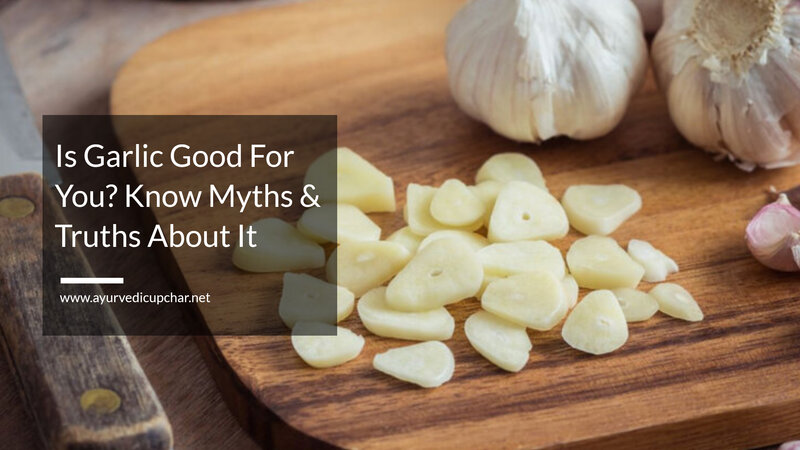Is Garlic Good For You? Know Myths & Truths About It
 Garlic is claimed to be nutritious, fighting cholesterol, supporting the immune system, lowering blood pressure, anti-inflammatory, preventing colds, and improving asthma, which is good even against cancer.
Garlic is claimed to be nutritious, fighting cholesterol, supporting the immune system, lowering blood pressure, anti-inflammatory, preventing colds, and improving asthma, which is good even against cancer.
If you have been recommended to eat raw garlic on an empty stomach as a remedy, you should know that, with rare exceptions, it will not do you any harm; But neither is it certain that it will rid you of your ailments or prevent you from getting sick.
What you will not be able to get rid of is that characteristic and persistent smell – and unpleasant for others – that it leaves on your breath. To get most of the benefits from it you should consume raw.
Antibacterial & Nutritionists Properties Of Garlic
Garlic is a herb that has been sued in various cultures around the world, in many different societies, and is thousands of years old.
There are many scientists who have dedicated themselves to studying it to corroborate whether it has as many healing properties as is believed, including Louis Pasteur a well-known scientist.
He was who first describe the antibacterial effect of onion and garlic juices although there seems to be a scientific basis for thinking that its components have many properties.
According to the National Center for Complementary and Integrative Health in the United States, not many are irrefutably conclusive and further research is required.
For example, they explain in an article published on their website that the National Cancer Institute of their country recognizes that garlic has potential anti-cancer properties.
But he does not recommend consuming garlic supplements for cancer prevention. And even less in the hope of curing it.
What are the contraindications of garlic?
It is known that eating raw garlic does not have contraindications in normal doses, except for people who produce stomach irritation or allergy. But it is noted that it can counteract the effect of medications on blood circulation (it is a powerful anticoagulant).
It has also been determined that it may decrease the effectiveness of drugs such as saquinavir, used in the treatment of HIV. Eating garlic on an empty stomach, which has the same effects taken at any time of the day, but is not of much use if swallowed whole.
The right thing to do is to crush it or, better yet, cut it into thin slices and, if you want to soften the flavor a bit, mix it with olive, flax, walnut, or coconut oil.
This is because its main therapeutic virtues come from allicin, a component that is not in garlic but is only released when alliin, a sulfur amino acid that, if present in it, comes into contact with oxygen.
It also has other substances, many of which act in symbiosis with it. Some of its active principles are found in the extracts sold in health food stores and by herbalists, but the effects are different depending on the method by which they have been obtained.
The most similar to natural is cold pressing, although for some uses a certain temperature is required. Another of its characteristics is that it is allicin -the average content in garlic juice is 4 milligrams per gram- it is very volatile and its effect is so immediate that it reaches the lungs in just seconds.
That is why it is considered appropriate to treat respiratory infections. The allicin in garlic is even capable of passing through the skin and reaching the blood capillaries. It can be easily experienced at home, checking how after putting some peeled garlic on the feet and in contact with the skin, its flavor is noticeable on the palate in a few moments.
Allicin is very volatile and its effect is so immediate that it reaches the lungs in just seconds, making it suitable for treating respiratory infections. The sulfoxides components, including alliin, which are what give it its characteristic smell and taste, enter the body through the digestive tract and, according to experts, have a powerful biological effect.
Another positive aspect of garlic is that it is very nutritious. About 28 grams contain 23% manganese, 17% vitamin B6, 15% vitamin C, 6% selenium, and about 0.6 grams of fiber. In addition to considerable amounts of calcium, copper, potassium, phosphorus, iron, and vitamin V1.
In fact, it is considered to have traces of practically everything that is needed to survive, although in minute quantities. And with hardly any calories, just 42, plus 1.8 grams of protein and 9 carbohydrates.
These are some of the many benefits of eating raw garlic according to supporters of this home remedy, backed by scientific studies, but still with much to discover and define.
In many cases, the doses that would be adequate, the frequency, or whether they may have side or harmful effects have not been established.
1. Antibiotic
The antibacterial activity of garlic is due to allicin and it is considered that the French scientist Louis Pasteur was the first to attribute this property to it in 1858. More recently, some studies claim that it can be effective against numerous gram-positive and gram-negative bacteria and bacteria. acid-corrosive, including salmonella and escherichia-coli. The positive effects on the microbial flora of dental plaque have also been studied.
2. Antifungal
There are many mushrooms sensitive to garlic. It seems that the extracts of this plant are capable of reducing the need for oxygen in some of these organisms, which slows down their growth and inhibits the synthesis of lipids, proteins, and nucleic acids.
Its extracts are used in certain places to control pests in agricultural areas because it is believed to be as effective as insecticides and much less harmful.
3. Antivirus
Its ability against viruses has been less studied, although in vitro research has established that it has some activity against influenza. It has not been 100% proven to be effective in preventing colds.
A study carried out over 12 months revealed, for example, that those who took a supplement of this vegetable had 63% fewer colds than those who had taken a placebo and also reduced sick days by 70%, which, there were five for those subjected to the placebo and one and a half for the rest.
There are other similarities, but experts believe that the samples are not enough because the specific doses that could be therapeutic or if they present contraindications or side effects have not been established.
4. Cholesterol
Lowering cholesterol is one of the main reasons to consume garlic extracts in the United States. In most of the studies that have resulted in a reduction in cholesterol, it was necessary to consume between half and a gram a day, but the decrease was not very significant in any case, it affected the “bad” cholesterol somewhat, but almost nothing in the good.
It seems that it depends a lot on the dose and that the more garlic you eat, the more the cholesterol level decreases, but it has been found that it eventually stops working. And it is not very clear which format of garlic if, in powder, extract, oil, or tablets is the most effective. So it is not recommended to trust a reduction in cholesterol levels to the intake of garlic.
5. Blood pressure
Apparently, the sulfur contained in this vegetable stimulates the production of nitric acid in the veins, which relaxes and improves their elasticity and allows a more fluid passage of the blood. According to a study published by the European Journal of Clinical Nutrition, subjects who achieved a significant reduction in blood pressure had taken between 480 and 960 mg of garlic (a clove weighs about 2 grams).
Some experts advise taking one or two garlic cloves on an empty stomach for a few days or weeks as needed. Others increase the dose to no less than four cloves of garlic daily for the result to be significant. But they warn that it should never be taken as a substitute for any drug in case of high blood pressure.
6. Antioxidant
Although several factors are known to influence neurodegenerative risk, it is not yet known how exactly they affect each person’s brain. In an article published in the Journal of Nutrition of the American Nutrition Society, garlic extracts contain antioxidants that prevent degenerative diseases.
Although they explain that this is achieved with fresh garlic extracts that have been aged for a period of no less than 20 months. The substance obtained has antioxidant properties due to the fact that very unstable molecules such as allicin have been modified to convert them into other stable ones.
That is why it can have palliative effects on aging-related ailments, such as dementia and Alzheimer’s. Although also, in this case, to notice its benefits you would have to eat considerable amounts.
7. Antitoxic
In high doses, the sulfoxides in garlic are a barrier against heavy metal toxicity. In this regard, studies have been carried out, including one in a car battery processing plant in which it was found that garlic helped reduce lead levels in the blood by 19%. It also prevented or reduced symptoms of metal poisoning such as headaches and high blood pressure.























